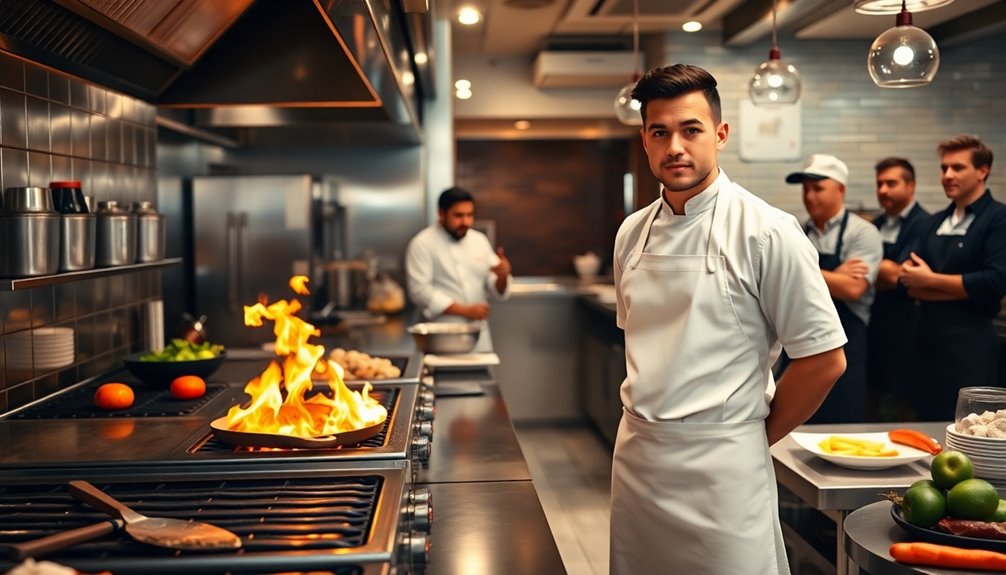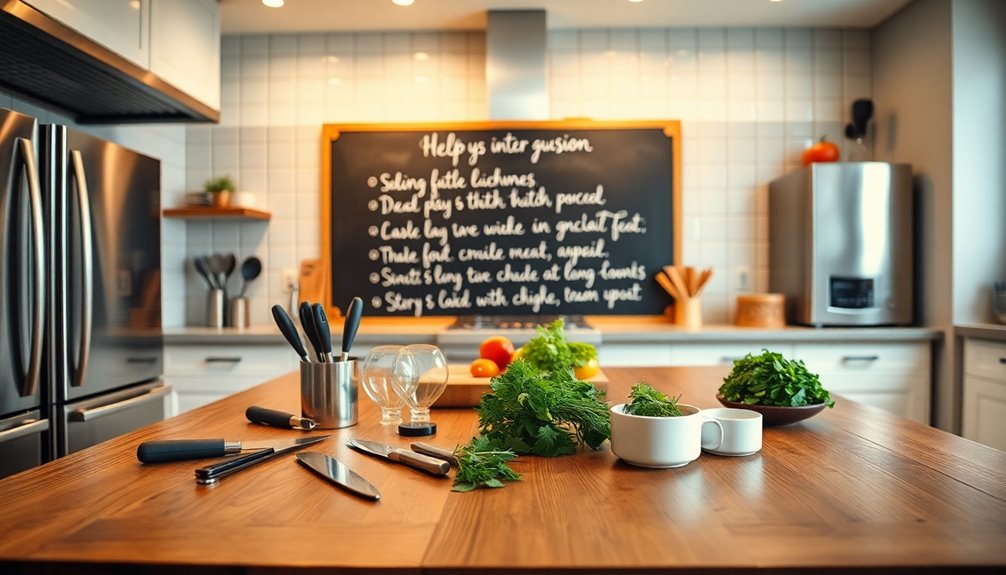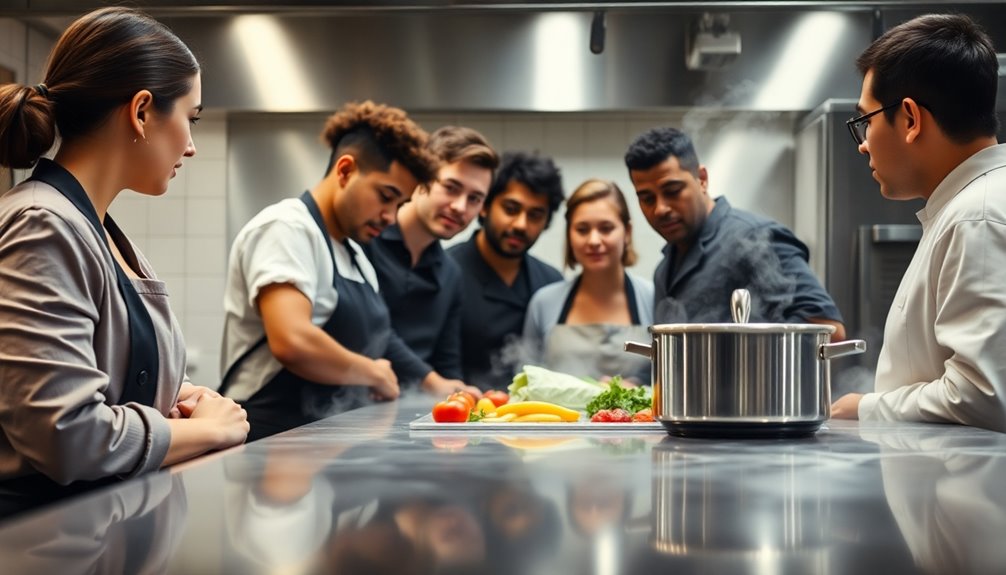When you're interviewing for a line cook position, it's vital to anticipate key questions. Be prepared to discuss your culinary background, including any formal training and your knowledge of various cuisines. They'll likely ask about your knife skills, cooking techniques, and how you handle busy shifts. Expect inquiries about conflict resolution, especially teamwork and communication under stress. Your ability to manage customer feedback is also important. Highlight your adaptability and commitment to continuous learning in the kitchen. These insights will showcase your readiness for the role. Keep exploring, and you'll uncover even more valuable tips for your interview prep.
Key Takeaways
- Highlight your culinary training and experiences, focusing on specific cuisines and techniques to demonstrate your expertise.
- Be prepared to discuss your knife skills and baking experience with relevant examples to showcase your versatility.
- Prepare to explain your approach to handling stress in a busy kitchen, emphasizing task prioritization and teamwork during peak hours.
- Share examples of how you've resolved conflicts with coworkers, demonstrating your ability to maintain professionalism and collaboration.
- Illustrate your customer service skills by discussing how you've handled negative feedback and improved the dining experience through effective communication.
Experience in Restaurants

When interviewing for a line cook position, your experience in restaurants plays an essential role in showcasing your culinary background. Be ready to discuss your previous roles and how they've shaped your skills.
Employers often ask, "Tell me about your experience working in a restaurant?" Highlight any formal training as a line cook and emphasize your knowledge of various cuisines.
They may also evaluate your knife skills and baking experience, so be prepared to share specific examples. Showing that you've tackled diverse tasks in a busy kitchen demonstrates your adaptability and competence.
Your ability to communicate these experiences clearly will help you stand out, making it easier for employers to envision you as a valuable addition to their team.
Culinary Knowledge Assessment

Demonstrating your culinary knowledge during an interview is essential for impressing potential employers. They want to see that you truly understand cooking techniques and concepts. Expect questions like, "What's the difference between broiling and braising?" Your ability to explain such terms shows depth in your culinary foundation.
Additionally, be prepared to discuss ingredient substitutions; knowing how to adapt recipes when faced with shortages is critical. Employers may also ask about sauce preparation, so familiarize yourself with different types and their uses.
Finally, show a commitment to ongoing skill development, whether it's through additional training or experimenting in your own kitchen. This indicates your passion for the craft and willingness to grow as a line cook.
Handling Stressful Situations

Stressful situations in the kitchen are inevitable, especially during peak hours. You'll need to demonstrate your ability to stay calm under pressure.
When asked how you handle stress, share specific strategies that work for you. For instance, explain how you prioritize tasks when orders pile up or how you focus on one dish at a time to maintain quality.
Let them know you're adaptable and can adjust to unexpected changes, whether it's a sudden rush or missing ingredients.
Highlight your experience in maintaining composure and effective communication with your team to guarantee smooth operations.
Ultimately, your ability to thrive in high-pressure environments will set you apart as a valuable line cook.
Conflict Resolution

Maneuvering the fast-paced kitchen environment often leads to disagreements, whether it's about a dish's preparation or how to handle a busy shift.
When conflicts arise, it's essential to address them professionally. Here are some strategies to take into account:
- Stay calm: Keep your cool to avoid escalating the situation.
- Listen actively: Give your coworkers a chance to express their viewpoints.
- Seek common ground: Focus on shared goals, like delivering quality dishes.
- Learn from experiences: Reflect on past conflicts to enhance teamwork in the future.
Customer Service Skills

Customer service is crucial in the culinary world, where a positive dining experience can turn a one-time visitor into a loyal customer.
You'll need to handle negative feedback with grace, turning complaints into opportunities for improvement. When asked about this in an interview, share specific strategies you use to exceed customer expectations, even during busy times.
Communication plays an important role; keep customers informed about delays and guarantee they feel valued.
Analyze feedback to refine your skills and enhance service quality. Demonstrating your commitment to a great customer experience shows potential employers you understand their bottom line and are ready to contribute positively to their team.
Your ability to connect with guests can truly elevate their dining experience.
Teamwork in the Kitchen

How can a kitchen thrive without effective teamwork? In this fast-paced environment, collaboration is key to success.
You'll need to communicate clearly and efficiently with your colleagues to guarantee everything runs smoothly. When you work together, you can tackle challenges head-on and maintain a positive atmosphere.
Here are some essential aspects of teamwork in the kitchen:
- Delegating tasks: Knowing who's responsible for what helps prevent chaos.
- Supporting each other: Being available to lend a hand when needed can lighten the load.
- Learning from experiences: Each dinner rush teaches valuable lessons about collaboration.
- Celebrating successes: Acknowledging team achievements boosts morale and fosters camaraderie.
Quality vs. Timeliness

In a bustling kitchen, the balance between quality and timeliness can make or break the dining experience. As a line cook, you'll often face the question: is it more important to get dishes out on time or guarantee high quality?
While timeliness is essential, you can't sacrifice quality for speed. Rushed dishes may lead to mistakes, disappointing customers and damaging your reputation.
To strike a balance, prioritize organization and preparation. Set up your station efficiently, so you can work quickly without cutting corners.
Practice multitasking and stay calm under pressure. Remember, satisfied customers come back, so commit to delivering both timely service and exceptional dishes, making sure they leave with a positive experience every time.
Ingredient Management
Effective ingredient management is essential for a successful kitchen operation.
You need to be proactive in ensuring you have everything necessary to create quality dishes. When faced with shortages, quick thinking and creativity can save the day.
Here are some strategies to contemplate:
- Always check inventory before service to anticipate needs.
- Communicate with your team about any potential shortages.
- Be prepared to improvise with alternative ingredients.
- Maintain a well-organized storage system for easy access.
Frequently Asked Questions
What Motivates You to Work in the Culinary Field?
When you think about what motivates you to work in the culinary field, it's likely a mix of creativity and passion for food.
You thrive on the excitement of crafting dishes that bring joy to others. The fast-paced environment energizes you, pushing your limits and honing your skills.
You love the camaraderie in the kitchen, collaborating with teammates to create memorable dining experiences, and every successful service fuels your desire to grow in this profession.
How Do You Stay Updated on Culinary Trends?
Staying updated on culinary trends is like tending a garden; you need to nurture it regularly.
You can follow culinary blogs, subscribe to industry newsletters, and join online forums to cultivate fresh ideas. Attending food festivals or cooking classes helps you get inspired and connect with fellow food enthusiasts.
Don't forget to experiment in your own kitchen, blending new techniques and flavors, ensuring your skills blossom alongside the ever-evolving culinary landscape.
Describe Your Experience With Food Safety Practices
When it comes to food safety practices, you've got to prioritize cleanliness and organization.
You guarantee that all surfaces are sanitized regularly and that raw ingredients are stored at the right temperatures.
You've learned to follow proper handwashing techniques and keep allergens separate to prevent cross-contamination.
What Is Your Favorite Dish to Prepare and Why?
When you think about your favorite dish to prepare, it likely reflects your culinary passion.
Maybe it's a classic risotto, where you can showcase your patience and attention to detail. You love how the creamy texture combines with fresh ingredients, creating a comforting meal.
Every time you stir the pot, you feel connected to the dish, and it reminds you of family gatherings, making the experience even more rewarding and enjoyable.
How Do You Handle Feedback From Chefs or Peers?
When you receive feedback from chefs or peers, it's essential to pause and assess the situation. Instead of reacting defensively, you take a moment to absorb their perspective.
You ask questions to clarify, showing your willingness to learn. Then, you implement their suggestions, transforming critiques into opportunities for growth.
This approach not only improves your skills but also fosters a collaborative kitchen atmosphere, ensuring everyone rises together to meet high standards.
Conclusion
Preparing for your line cook interview can feel intimidating, but with the right approach, you can shine. Think about how your experiences and skills align with the questions you'll face. Can you imagine stepping into that bustling kitchen, ready to create delicious dishes while collaborating with your team? By showcasing your culinary knowledge and teamwork abilities, you'll demonstrate that you're not just a candidate, but a valuable addition to any kitchen keen for talent.









